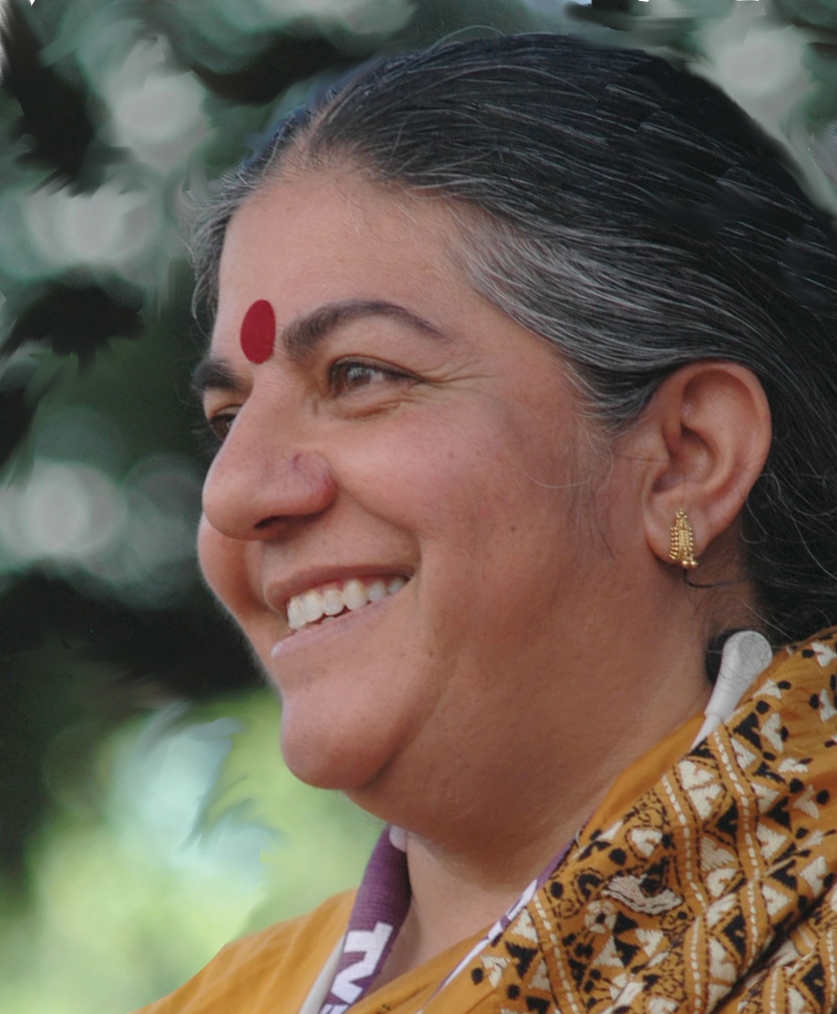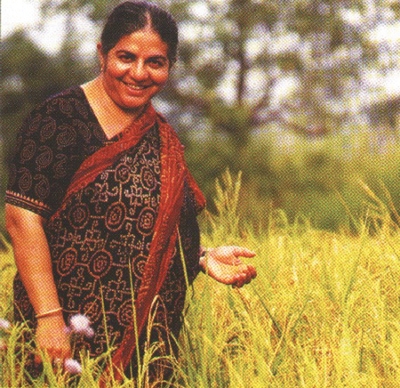|
Environmental Justice
|
|
A Return to the Land
Vandana Shiva's Campaign for Sustainable Agriculture in India Printable Version: Download
as PDF
I recently returned from a two-week Reality Tour with Global Exchange (see Jerlina Love's article on page 34) where we met Dr. Vandana Shiva, a well-respected environmental activist who carries on the legacy of Mahatma Gandhi. Shiva turned toward activism when she organized the Navdanya (Nine Crops) movement. Shiva founded Navdanya as a program of the Research Foundation for Science, Technology and Ecology - a participatory research initiative formed to provide direction and support to environmental activism. Navdanya arose out of a search for nonviolent farming, which protects biodiversity, the earth and our small farmers. Navdanya refers to the nine crops that represent India's collective source of food security.
The Birth of Navdanya
The main aim of the Navdanya biodiversity conservation program is to support local farmers, rescue and conserve crops and plants that are being pushed to extinction, and make them available through direct marketing. As an insurance against such vulnerability, Navdanya pioneered the conservation of biodiversity in India and built a movement for the protection of small farmers through promotion of ecological farming and fair trade to ensure healthy, diverse and safe food. The movement has spread throughout India through its partner organizations and farmers' networks.
Navdanya Shifts the Farming Paradigm Navdanya's pioneering research on the hazards of chemical farming, the costs of industrial agriculture and the risks of genetic engineering have led to a paradigm shift. Their research has proved that contrary to the dominant assumptions ecological agriculture is highly productive and is the only lasting solution to hunger and poverty. Biodiversity-based farming has changed the economic status of the member farmers across the country. Organic agriculture provides not only a source of safer, healthier, tastier food, but it also yields a solution to rural poverty.
Navdanya's Three Swarajs: Seed Food, and Water
Global Exchange Tour of Navdanya Farm
Meeting With Dr. Vandana Shiva In addition, Monsanto has marketed terminator seeds -
which do not produce seeds that can be harvested and used
for the following year's planting - as well as expensive
chemical fertilizers to Indian farmers who cannot afford
to keep buying them. These forces combine to cause farmers
to go into debts they can't afford to pay. Culturally,
farmers feel great shame when they can't repay their debts.
So, many end up committing suicide. The power of corporations has negatively influenced Indian politics. For example, India passed the Special Economic Zone Act, a law that authorizes the Indian government to repossess land and give it to multinational companies who aren't accountable to India's laws. Part of India's technology boon comes at the expense of farmers, who lose land to multinational companies setting up shop both in cities and increasingly in the rural areas. Besides land, these companies use vast amounts of water and pollute the environment. In addition, the government is grabbing more and more farmland for supermarkets and housing. Shiva says she feels that the government's laws are increasingly providing more "freedom for global corporations, but dictatorship for normal people."
Shiva's Response to Current Challenges Most recently, Shiva authored Earth Democracy published
by South End Press. Earth Democracy offers a set of principles
based on inclusion, nonviolence, reclaiming the commons
and freely sharing the earth's resources. These ideals,
Shiva believes, will serve as unifying points in our current
movements, an urgent call to peace and the basis for a
just and sustainable future. Shiva encouraged us to measure our actions in the following way: "Think of the lowest person and see if your actions are impacting that person's life." Shiva's final advice to us: "Follow your heart and do what nourishes you. You can't just respond to the negative. You only know who you are when you know what you love. Activism has its fashions, too. If you follow those fashions, you will burn out. You must find your own passion. That will give you the power to resist."
Ken Preston-Pile is Training Coordinator for Pace e Bene Nonviolence Service, where he has led hundreds of trainings in nonviolent peacemaking. He also organizes speaking events for Global Exchange, a human rights organization based in San Francisco. Contact him at kenpreston (at) paceebene (dot) org. |
|
|
Resources: Navdanya's
Website |
|


